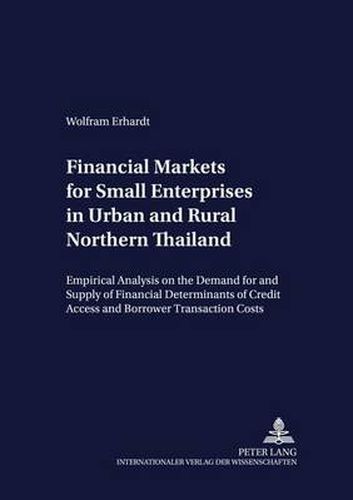Readings Newsletter
Become a Readings Member to make your shopping experience even easier.
Sign in or sign up for free!
You’re not far away from qualifying for FREE standard shipping within Australia
You’ve qualified for FREE standard shipping within Australia
The cart is loading…






This study examines the demand for and supply of financial services for small entrepreneurs in Northern Thailand. Particular emphasis is placed on credit technologies deployed by formal and informal institutions and on determinants of credit access and borrower transaction costs. The study complements and expands on existing research into micro-finance by adding a specific regional dimension. A remarkable situation of urban bias in reverse has been detected as far as access to formal finance is concerned. Conventional access variables (such as education and the level of household income and assets) do not explain rural households’ access to institutional credit sources, while these factors turned out to be powerful determinants in explaning urban households’ access to formal finance. This can be explained by the efforts on the part of the Thai government to improve access to credit for small rural enterprises. The author concludes that the neglect of rural finance and the lack of innovative financial approaches is, to a significant extent, also the result of political priority-setting and decision-making; it cannot be attributed to unattractive investment possibilities alone.
$9.00 standard shipping within Australia
FREE standard shipping within Australia for orders over $100.00
Express & International shipping calculated at checkout
This study examines the demand for and supply of financial services for small entrepreneurs in Northern Thailand. Particular emphasis is placed on credit technologies deployed by formal and informal institutions and on determinants of credit access and borrower transaction costs. The study complements and expands on existing research into micro-finance by adding a specific regional dimension. A remarkable situation of urban bias in reverse has been detected as far as access to formal finance is concerned. Conventional access variables (such as education and the level of household income and assets) do not explain rural households’ access to institutional credit sources, while these factors turned out to be powerful determinants in explaning urban households’ access to formal finance. This can be explained by the efforts on the part of the Thai government to improve access to credit for small rural enterprises. The author concludes that the neglect of rural finance and the lack of innovative financial approaches is, to a significant extent, also the result of political priority-setting and decision-making; it cannot be attributed to unattractive investment possibilities alone.